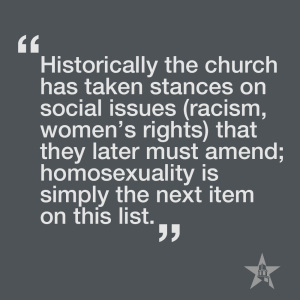In my last article, “Homosexuality and the Chruch | Part 1,” I addressed the issue of how the church should respond and treat the LGBTQ community. Changing behavior is not a particularly simple or easy task, especially when that attitude or behavior is rooted in centuries of dogma and tradition. In fact, church doctrine typically serves as the basis for action. This typically comes out in positive ways when the church takes it upon itself to care for the poor, feed the hungry, etc. However, when our doctrine says something intrinsically negative, our actions seem to follow suit.
 The church has problems dealing with its congregations full of sinners. Grace and forgiveness are exceedingly hard to extend, and judgment is often cast instead. If Paul condemns the adulterer, so does the church. If Jesus condemns the Pharisee, the church condemns their modern day equivalent. Sin is a recurring problem, and yet it is an issue that we perhaps don’t fully understand. The common picture of sin that the church gives is characterized by specific actions: adultery, lying, murder, etc. However, reducing sin to mere actions misses the point of what sin is. It has to be more than breaking the rules. A more accurate understanding is that of sin as separation from God. With this definition of sin in mind, it gives us cause to reevaluate what is actually sin and what is not. Homosexuality, I will argue, is not the sin the church has believed it to be. Thus in adjusting her theology, the church will be able to change her behavior toward the LGBTQ community in significant and lasting ways.
The church has problems dealing with its congregations full of sinners. Grace and forgiveness are exceedingly hard to extend, and judgment is often cast instead. If Paul condemns the adulterer, so does the church. If Jesus condemns the Pharisee, the church condemns their modern day equivalent. Sin is a recurring problem, and yet it is an issue that we perhaps don’t fully understand. The common picture of sin that the church gives is characterized by specific actions: adultery, lying, murder, etc. However, reducing sin to mere actions misses the point of what sin is. It has to be more than breaking the rules. A more accurate understanding is that of sin as separation from God. With this definition of sin in mind, it gives us cause to reevaluate what is actually sin and what is not. Homosexuality, I will argue, is not the sin the church has believed it to be. Thus in adjusting her theology, the church will be able to change her behavior toward the LGBTQ community in significant and lasting ways.
Catholic priest and theologian James Alison, a gay man himself, calls himself an “educated amateur” when it comes to the topic of homosexuality. In his article The Fulcrum of Discovery or: How the ‘Gay Thing’ is Good News for the Catholic Church, Alison lays out his basic premise which is two-fold: first, “what we call ‘straight’ or ‘heterosexual’ is not the normative human condition,” humanity is not “intrinsically heterosexual,” and second, homosexuality is “not a vice or a sickness. It is simply a regularly occurring minority variant in the human species.”
Alison rejects homosexuality as being any sort of psychological or physiological pathology, and instead argues that it is a minority variant that regularly occurs, “independent of culture, habitat, religion, education, or customs.” The reality of “being gay” is lived in “an entirely culture-laden way” just like any other human reality, which is why, Alison argues, it has been often misinterpreted as being merely “a function of culture, psychology, religion or morality.” This is why the church has gotten historically “worked up” over the issue; if she simply saw it as something that is just there, not something wrong or something to fix, “being gay” would be a non-issue. Alison finds support for this claim and argues that there is no longer scientific evidence to reinforce the idea that homosexuality is inherently odd or wrong. It is merely an objectively true fact of being human that some individuals (between three and four percent across all cultures according to Alison) are attracted to members of their own sex.
 Surprise, humanity is more complex than we (the church included) had originally thought. Historically the church has taken stances on social issues (racism, women’s rights) that she later must amend; homosexuality is simply the next item on this list. The church has new information at her disposal and it is her responsibility to make amends and reform not just her attitude and behavior, but her doctrine as well.
Surprise, humanity is more complex than we (the church included) had originally thought. Historically the church has taken stances on social issues (racism, women’s rights) that she later must amend; homosexuality is simply the next item on this list. The church has new information at her disposal and it is her responsibility to make amends and reform not just her attitude and behavior, but her doctrine as well.
Honestly, when the idea of “being gay” is given any amount of thought, it is hard to say why (aside from culturally dependent and misunderstood Biblical passages) it would be a sin. Why is being attracted to a member of your own sex such a bad thing? Shouldn’t what matters the most be love? Why should we care the context in which that happens if it is a healthy and safe one? The homosexuality that Paul talks about is not this; it concerned abusive relationships between older men and younger boys. This I can see being a sin. Two men or two women simply falling in love does not compute as sin for me, I agree wholeheartedly with Alison. If our image of God is so small that only heterosexuality is acceptable in his design of humanity, we have bigger worries than marriage equality.

“The gospel demands everything of all of us. If someone thinks the gospel has somehow slotted into their life quite easily, without causing any major adjustments to their lifestyle or aspirations, it is likely that they have not really started following Jesus at all. And just as the cost is the same for all of us, so too are the blessings.” Sam Allberry
It goes without saying that we must love one another and treat each other equally. But this does not mean we can overlook sins. As you are doing, Holly.
I don’t understand why you are accepting some teaching and rejecting others. This is blatant heresy. If you cannot repent from your sins, no matter what sins they may be, you will not inherit the kingdom of God. Practicing homosexuality is a sin. Having homosexual feelings is a burden. Deal with it. God says so.
If you believe practicing homosexuality is not a sin, than you cannot be called a Christian. For people’s sake, this is so obvious and yet some decide they will ignore it because it’s easier to sin than not.
If you don’t believe me, read the Bible. I pray earnestly for your soul and that you will understand God’s plan for us all.
1 Corinthians 6:9 NIV
Romans 1: 26-27 NIV
1 Timothy 1:9-10 NIV